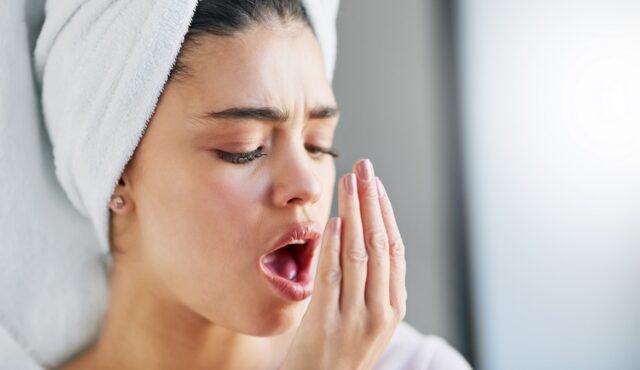Picture this: You just finished brushing your teeth and spit leftover toothpaste into the sink. You look up into the mirror to check your teeth and boom—you’re hit with a not-so-great smell. Aaaand it’s your breath. How is this possible? (You did just brush your teeth, after all.) Well, bad breath can come from your throat, too.
We’ve all been hit with bad breath from time to time, or what doctors call halitosis. It’s usually from something you ate (hello, delicious garlic bread), but sometimes, it can be a sign of an underlying condition. This is especially true if your breath still stinks after brushing your teeth, says Jason Abramowitz, MD, an otolaryngologist with ENT and Allergy Associates in Paramus, New Jersey.
Bad breath from your throat, in particular, can be from a number of things. Here, learn more about what’s causing your bad breath, and how to get back to peak minty freshness, stat.
1. Cold or infection
If you’ve got a cold or another upper respiratory infection (like RSV, COVID-19, the flu), that’s when bad breath is likely coming from your throat. Even bad breath from strep throat is possible. It’s all thanks to mucus, which your body makes a ton of when you’re sick in an attempt to get rid of any viruses or bacteria, says Dr. Abramowitz. “This mucus is usually mixed with some of the normal bacteria in your throat, which can give it a bad odor,” he adds.
And a stuffy nose only adds to the problem. “When we’re congested, our noses do not moisturize the air normally. This dries out saliva and mucus in your nose and throat and can contribute to odor,” says Dr. Abramowitz. Congestion might also force you to breathe through your mouth, too, which can lead to dry mouth.
What to do about it
Your breath should freshen up on its own as you start to feel better and have less mucus. In the meantime, you can use a nasal saline rinse or saltwater spray to wash away excess mucus and gunk from your nasal passages, says Dr. Abramowitz. One of his picks is NeilMed Sinus Rinse ($14.99, Amazon).
You can also try to sip plenty of fluids, too—think water, tea, broth, or juice—to keep your mouth and throat tissue hydrated.
2. Allergies
Seasonal allergies can cause many of the same symptoms as a cold, including loads of mucus in your throat, a stuffy nose, and dry mouth if you’re too congested to breathe through your nostrils. Basically, they’re just as likely to make your breath smell unpleasant, says Dr. Abramowitz.
What to do about it
The best ways to freshen bad breath from allergies are the same as when you have a cold or infection. Try rinsing your nasal passages and drinking plenty of fluids to help thin mucus and breathe easier.
3. Tonsil stones
Tonsil stones are tiny, rock-like lumps that form in the pockets of your tonsil glands. They’re often made up of minerals like calcium, old food, and bacteria, per the Cleveland Clinic. (If you’re gagging right now, that’s totally understandable.)
Along with sounding unpleasant, tonsil stones can also cause bad breath from your throat. “Dry old food with bacteria has a foul odor,” says Dr. Abramowitz.
Not everyone gets tonsil stones—those most at risk are people who get frequent tonsillitis (i.e., infections), have enlarged tonsils, or are dehydrated often.
What to do about it
The good news? You can often get rid of tonsil stones by gargling with salt water, spraying your tonsils with a water pick (you’ll be able to see them in the back of your throat—they look like little white clumps), or even just coughing really hard.
Or if you’re really brave and don’t have a gag reflex, you could try to brush them away with a cotton swab, suggests the Cleveland Clinic. And if they’re not budging? You could wait it out (they might go away on their own) or see your dentist, who can remove them for you.
4. Acid reflux
The occasional bout of acid reflux, or the more chronic version, called GERD (gastroesophageal reflux disease), can definitely make your breath stink. Acid reflux happens when stomach acid and partially digested food rush back up into your throat—which can cause a bad taste or smell in your mouth, per the Mayo Clinic.
What to do about it:
Treating acid reflux should help solve bad breath from your throat. You can do this by avoiding triggering foods (like fried or spicy foods), not eating late at night, and sleeping with your head elevated. If that’s not cutting it, your doctor might recommend taking an over-the-counter (OTC) or prescription antacid, per the National Institute of Diabetes and Digestive and Kidney Diseases (NIDDK).
Can bad breath from your throat be something serious?
Sometimes chronic bad breath is driven by a more severe problem. Conditions that can cause halitosis include the following, per the Cleveland Clinic:
- Diabetes
- Head and neck cancers
- Liver or kidney disease
- Sjögren’s syndrome (an autoimmune disease)
If you’ve been diagnosed with any of the above, let your doctor know if you start having bad breath. They can come up with treatment options, or work toward managing your underlying condition, which should help clear bad breath, too.
How to get rid of bad breath from your throat
Treating bad breath from your throat often starts with prevention. Having a solid oral hygiene routine and keeping your throat hydrated is important. Basically, it pays to brush, floss, and see your dentist regularly.
If you’re sick or dealing with allergies, keep a saline rinse or nasal spray handy and drink plenty of fluids to help keep your mouth and throat from drying out, which can contribute to bad breath, says Dr. Abramowitz.
And if you’re trying to neutralize odor quickly, you can try something like sugar-free gum, a lozenge (for sore throats), or even special mouthwashes for smelly breath.
When to see a doctor
If you get sudden bad breath from your throat and mouth, it’s likely from a meal you just ate, or because you’re stuffed up from a cold or allergies. Your breath should return to normal fairly quickly.
But if your bad breath doesn’t improve with home remedies or tooth brushing, or happens all the time, let your dentist know, says Dr. Abramowitz. They can check for any potential underlying health conditions, recommend treatments, or refer you to another specialist, like an ear, nose, and throat (ENT) doctor, if needed.
FAQ
Why do I get bad breath after a workout?
While there’s no exact scientific reason you get bad breath after a workout, it’s likely due to all the huffing and puffing you do when you’re performing certain exercises. All that air coming in and out of your mouth (essentially, you’re mouth-breathing) can dry things out and lead to a mild case of bad breath. This can typically be solved by drinking some water or gargling some mouthwash when you get home.
Why do I have bad breath in the wintertime?
There are a couple different reasons why you may get a case of wintertime bad breath. For one, the air indoors and outdoors becomes much drier, which can dry out your mouth and throat, leading to bad breath. You may also (subconsciously) drink less water in the wintertime than in, say, the summer, because you’re likely sweating less often. This dehydration could lead to a case of halitosis as well.
Our editors independently select these products. Making a purchase through our links may earn Well+Good a commission.










